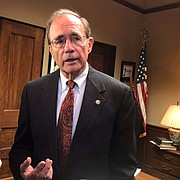Wednesday, January 8, 2020
"We won it all!" cried Gov. Phil Bryant, exultant in victory behind the podium at the GOP's election-night party at the West Jackson on Tuesday, Nov. 5.
"We know who we are!"
Mississippi, in the twilight of Bryant's gubernatorial career, had held onto its ruby-red reputation. At the podium, Bryant recalled a time when Mississippi seemed just out of reach of Republican control. It was the 1980s, a period nationwide of revitalization for the GOP, the decade of trickle-down Reaganism.
In Mississippi, though, it was the era of William Winter, a segregationist turned public-education-friendly Democrat years after the Dixiecrats started defecting to a new Republican Party.
The high-water mark was the transformational Education Reform Act of 1982 and the raft of reformers, including future Gov. Ray Mabus and Secretary of State Dick Molpus. "They called 'em 'the boys of spring,'" Bryant teased gleefully about distant history. "People thought they could walk on water."
It was a particularly barbed rebuke to a moment many thought to be revolutionary and a new era of humanity for Mississippi. And Bryant's triumphalism has cause: Gov.-elect Tate Reeves' tenure in office will bring the GOP to 20 years of uninterrupted executive control in Mississippi and an equally complete grasp over the Legislature. If the era of Donald Trump will foster a renaissance of Mississippian progressivism similar to Winter's, it will surely happen somewhere outside the halls of power.
Republicans ran the table in Mississippi 2019's elections, leaving the state in the hands of Reeves and the Legislature to new Lt. Gov. Delbert Hosemann, the new president of the Senate, and House Speaker Philip Gunn, R-Clinton. The executive shuffle complements a greater share of Republican legislators in the Mississippi Senate than in living memory. In spite of a small Democratic minority gain in the Mississippi House, the outcome is clear: The GOP is in control.
After Bryant spoke, newly elected State Auditor Shad White addressed the outgoing governor directly. "You may not be on the ballot," White said, "but your legacy is."
Political Daylight?
The GOP's newfound dominance in Mississippi does not mean a pacified Legislature, outgoing House Minority Leader Rep. David Baria, D-Bay St. Louis, says.
Baria believes that real political daylight exists between the two men now inheriting the most powerful positions in the state. That distance is philosophical as well as material: both differ wildly in their belief in the role of government in public policy and their approach to the legislative freedom afforded to committee chairs and other legislators.
"I believe based on what I know about Delbert Hosemann and what I heard him say at his election-night victory speech, that he is going to be more open to ideas that have been championed by Democrats and Republicans alike—ideas that would move Mississippi forward," Baria said in an interview.
Chief among those ideas is Medicaid expansion, which Hosemann has repeatedly indicated his willingness to consider. Reeves, however, unequivocally opposes expansion.
The top-to-bottom control Republicans now hold in Mississippi's branches of government is likely to reveal internal divisions over the many spending opportunities that even the most parsimonious legislators acknowledge are now on the table. In the past, Baria said, "we couldn't get any traction with Republicans, and we certainly couldn't get any support from Tate Reeves."
But Hosemann represents "a more centrist position than Reeves," Baria added about the new Senate president.
Hosemann's legislative leadership, too, may contrast with Reeves. Baria lamented changes in how bills are typically drafted over the last decade. "Legislation is not being openly crafted in the committee, it's being crafted in the caucus meeting," he said.
The Republican caucus meetings are not open to the public or the press, a fact Baria suggests is "violative of the Open Meetings Act and House rules. Because they constitute more than a majority of the House of Representatives when they call the caucus."
The power of that supermajority caucus means that legislation is conceived and deliberated upon with no public awareness. "You have a small cadre of people close to the speaker (Philip Gunn) making decisions for everyone. The train, once it leaves the station, rarely gets derailed," Baria said. "Hosemann says he's going to be more open and inclusive, and I take him at his word." Speaker Gunn's team declined a request for an interview. Reeves' team requested written advance questions for the governor-elect, which violates the Jackson Free Press' reporting ethics policy.
Hosemann, at a campaign event last year, spoke of when "we worked across the aisle, back when Democrats controlled the House of Representatives and Republicans controlled the other side." The next four years will test his commitment to that bygone past.
Financial Temperance
Hosemann lauds Reeves and Gunn for presiding over years of austerity. "We are fully funded in our rainy-day fund. That saves us about $50 (million) to $80 million per year," he said Dec. 17 at the Capitol, adding that Reeves had claimed the State had set aside more than $1 billion in additional capital.
In October, Gov. Phil Bryant celebrated the rainy-day fund reaching its legal limit of $554.8 million.
But Mississippi's financial temperance is not without its pitfalls. The state's public welfare services have reached a crisis point. U.S. District Judge Carlton Reeves placed the mental-health system on the path to receivership, writing a scathing decision in September that the state "unlawfully discriminates against persons with serious mental illness."
The opinion detailed a litany of critical failures in the state's system, and comes after years of warnings—from both within the state and beyond—that the structure, not just the quality of treatment, is badly outdated. The 5th U.S. Circuit Court of Appeals' opinion centered the need for community-based mental-health solutions. A majority of the state's districts are critically underserved, based on this metric.
Mississippi's child-welfare system is at a similar crossroads. Federal receivership is a possibility for Mississippi Department of Child Protection Services as well, though experts reached for this story unanimously stated that the agency is making greater strides toward its court-mandated goals than the state's mental-health services.
Litigators representing the plaintiffs in the Olivia Y. case, which in 2008 found failings on the part of the department that served as the Mississippi Department of Child Protection Services' predecessor, have repeatedly pressured the federal court system to take over the agency. Its current commissioner, Jess Dickinson, recently announced his retirement and will leave with Phil Bryant.
Outgoing Rep. Greg Snowden, R-Meridian, who previously served on the Joint Legislative Budget Committee, said he believes that the incoming lieutenant governor will not allow either of the state's public-welfare institutions to fail. Snowden anticipates that the Legislature will appropriate the missing funding during the actual session.
But the survival of these institutions may depend as much upon leadership as it does funding. Gov. Reeves will find a replacement for Commissioner Jess Dickinson early in 2020, and outgoing Mississippi Department of Human Services Director Christopher Freeze alongside him. Justice Reeves' decision will likely lead to the appointment of a receiver for the Department of Mental Health who will guide the institution's next steps.
Medicaid Expansion
In the past, Hosemann has told this newspaper that he is considering Medicaid expansion. "The critical component to me for expansion is that it breaks even," Hosemann said last January. "I can't afford to do $250 million or $500 million to expand health care, and still pay my teachers or pay for infrastructure."
To satisfy those needs, Hosemann says Mississippi should pursue models comparable to Arkansas' work requirements for continuing Medicaid coverage, or Indiana's two-tier system of Medicaid coverage based on payment of monthly premiums. At a press conference in December, Hosemann did not embrace Medicaid expansion for this session, but did not reject it outright either. "The appetite is for health care," he said, again pointing to Arkansas and Indiana.
This makes Medicaid expansion the most prominent faultline between the political wills of Hosemann and Reeves, a project Reeves blocked in his capacity as lieutenant governor as far back as 2013. A 2012 U.S. Supreme Court decision made the Medicaid expansion optional by declaring its enforcement unconstitutional. The expansion aims squarely at Mississippians between those below the poverty line and those whose income and job benefits make private insurance feasible: the Medicaid gap. Estimates for the number expansion would affect range up to 300,000 citizens, though Hosemann told the Jackson Free Press that he believes the number is between 100,000 to 200,000.
"There are other ways to more instantaneously affect health care for individuals," Hosemann said. In a follow-up request for specifics, Hosemann's team declined an interview and sent a prepared statement suggesting non-specific plans were in the works.
What is concrete, however, is that the perceived pitfalls of Medicaid expansion are a key concern. "When we do this, we have to learn from anybody else's mistakes," Hosemann said on Dec. 17.
Baria is not convinced Medicaid expansion will happen this session, but stressed the necessity of decisive action. "Every day that goes by in Mississippi without expanding Medicaid, we lose $3 million," he said.
The Mississippi Hospital Association's "Mississippi Cares" program represents the middle ground of Medicaid "reform." The program combines the reform provisions of Arkansas and Indiana, providing opt-in premiums of $20 a month to employed residents in the Medicaid gap. Hospitals in the MHA would cover the 10% that federal funds do not cover, allowing Mississippi use federal money currently left on the table each year without additional contributions from the State's budget.
Snowden, like Hosemann, and almost every other Republican legislator reached for this story, was noncommittal but willing to entertain the idea. Sen. Chris McDaniel, R-Ellisville, explained the unease as conservative unwillingness to provide entitlements that might grow in cost over time.
"We know that Medicaid tends to expand. That creates a drain for other portions of the state budget," McDaniel said in an interview at his home. He was as dismissive as Reeves on the subject of Medicaid expansion. "Any expansion at this stage takes us down a fiscally unsustainable path," he said.
Rep. Jarvis Dortch, D-Jackson, doubts the value of reform provisions in a program like Medicaid. Dortch brought up a Center on Budget and Policy Proposals study that showed work requirements causing thousands of individuals to lose their health care, with no increase in employment.
"It's having health insurance," Dortch stressed, "that actually leads people to work more. Because they're healthy." Many means-testing provisions, Dortch said, are "just far-right policies that don't really help anybody." But, he acknowledged, Democratic legislators likely will have to accept some additions they disagree with.
Roughly 37% of Mississippians carry some form of medical debt, the highest of any state in the nation. The inability to pay for medical care has a material effect: The state ranks last in the nation in metric after metric, from infant mortality to life expectancy. Beyond the impact of debt on residents, Mississippi's mountain of health-care debt has left roughly half of its rural hospitals at risk of closure, a rate more than twice the national average.
Teacher Pay
Public-teacher pay parity with the rest of the nation may be the only broadly accepted priority in the Legislature this year. But the outcome likely will not be swift enough to offer Mississippi teachers truly competitive salaries. Gov.-elect Reeves ran on a platform of a $4,300 raise for teachers, but that increase would take place over five years, possibly still leaving Mississippi with the worst paid public-school teachers in the country.
"If that raise happens over five years, will it leave us in a better spot or will other states have moved on?" Dortch said.
As lieutenant governor, Reeves blocked a $4,000 pay bump over two years last session, opting for a flat raise of $1,500. That increase failed to keep up with the rate of inflation since the last raise, passed in 2014. Reeves' plan would bring Mississippi in line with surrounding states' present teacher salaries. As of the 2018-2019 school year, the National Education Association ranked Mississippi's teacher pay as the lowest in the nation.
Lt. Gov.-elect Delbert Hosemann was positive about the potential for greater teacher pay at the Capitol on Dec. 17, insisting he would aim higher than Reeves had estimated. Hosemann insisted that Mississippi teachers deserved the "respect" of prompt action to improve their compensation.
"Why do we have to be average? Why can't we be above? I'm not held to $4,000," Hosemann told the Jackson Free Press. "When we get to a point that our teachers are not making an economic decision whether they teach or not, then I'll have gotten there."
Abortion
Abortion restrictions are an issue many expect to see rising from Mississippi's Legislature, but lawmakers suggested that more significant legislation on abortion rights was unlikely this session. Sen. Joey Fillingane, R-Sumrall, one of the Mississippi GOP's leading anti-abortion crusaders, acknowledged that a wait-and-see approach is likely, thanks to the large number of currently ongoing legal battles over past legislation.
"I think it's a little unsure right now, because you do have several test cases headed to the (U.S.) Supreme Court," he said in an interview.
That may include legislation he pushed. In 2019, Fillingane was one of the primary sponsors of SB 2116, a bill that bans abortions after the detection of a fetal heartbeat, which can start as early as six weeks into a pregnancy. Gov. Phil Bryant signed that bill into law in late March of 2019, but later in May District Judge Carlton Reeves granted a temporary injunction against the law. Mississippi's efforts to block abortion depend on the outcome of another state's: Louisiana.
Currently, the U.S. Supreme Court is scheduled to decide June Medical Services v. Gee, over Act 620, Louisiana's implementation of the admitting-privileges law. Act 620 requires all doctors employed at abortion clinics to have admitting privileges at a hospital no further than 30 miles away.
While advocates tout the restriction as a measure of protection for women seeking abortions who face medical complications, abortion-rights activists point out that its practical effect is the virtual outlawing of abortion access. For Louisiana, full adoption of the admitting-privileges law would mean every abortion clinic in the state would close except for one.
Fillingane seems confident that the fight will continue at a higher court. "I have every reason to believe that this most recent ruling from the Fifth Circuit will also be appealed. I think the governor has also indicated that," he said.
The legislator is content, for the moment, to see how Trump's remaking of the judiciary will affect these pending cases. "We're at the mercy of the U.S. Supreme Court," Fillangane said, while lauding the efforts of his party to restrict abortions in Mississippi in recent years.
Long term, however, Fillingane's desire is for a post-Roe v. Wade America, and a Mississippi free to determine its own tight control over abortion access inside the state.
"I would envision seeing legislation that would say that there would be no abortions except to save the life of the mother," Fillangane said. He was direct when asked if that exception would include cases of incest and rape.
"It would not," he said.
Email state reporter Nick Judin at [email protected] and follow him on Twitter at @nickjudin. Ashton Pittman contributed to this story.



